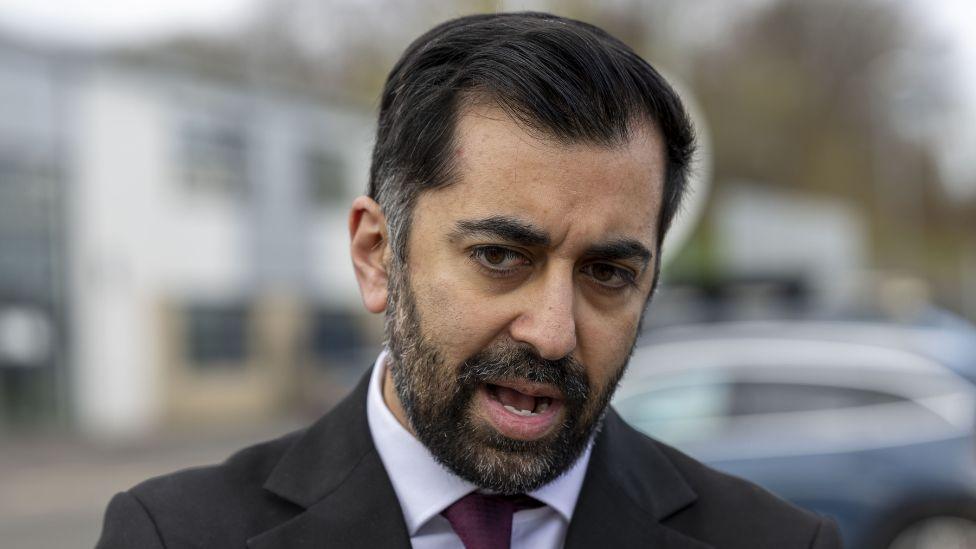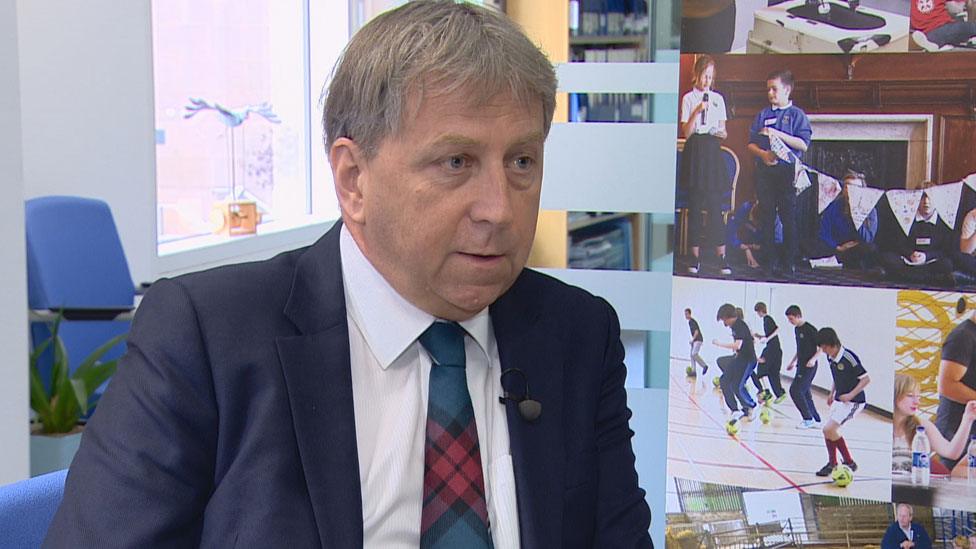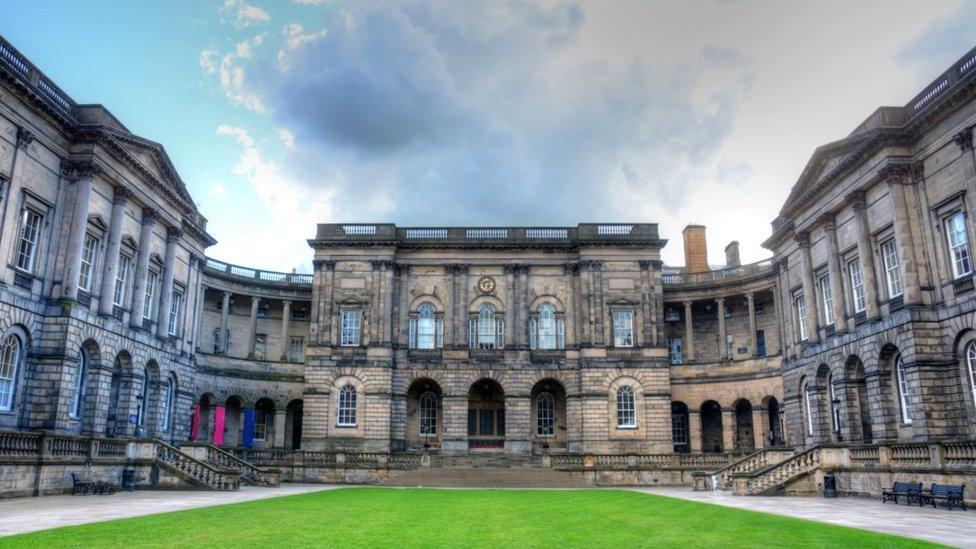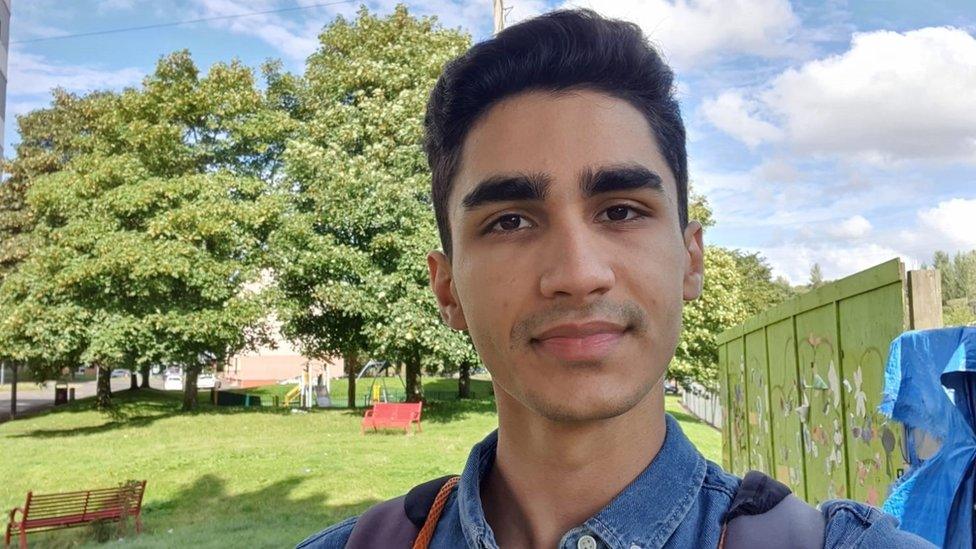Humza Yousaf 'committed' to free tuition for Scots
- Published

First Minister Humza Yousaf has rejected calls for the government to consider charging wealthier Scottish students for university tuition
Humza Yousaf has insisted he is "absolutely committed" to free university tuition for Scottish students despite calls for a rethink.
University of Edinburgh principal and vice-chancellor Sir Peter Mathieson said allowing wealthier families to pay was "worthy of calm consideration".
He argued the move could prevent a brain drain from Scotland.
The first minister said he was "very proud" of the SNP's opposition to tuition fees.
He also took aim at Sir Keir Starmer, who said Labour is "likely" to abandon its opposition to university tuition fees for students in England as it could not "ignore the current economic situation".
"It is a shame that we have had recently Keir Starmer say that he won't do the same for students in England," Mr Yousaf told BBC Scotland.
"So I'm absolutely committed to ensuring we have free education. University education should be on the ability to learn not the ability to pay."
The then Labour-Lib Dem Scottish executive abolished up-front tuition fees in 2001. However, graduates were still required to pay back a portion of fees once they earned enough to meet a repayment threshold.
The endowment was scrapped by the SNP government in 2008, with universities allocated funding to cover the free tuition.
Students from the rest of the UK (rUK) pay annual fees of up to £9,250, while fees for foreign applicants can rise even higher.
'Talent and money leaving Scotland'
The policy was championed by former first minister Nicola Sturgeon and her predecessor Alex Salmond.
Mr Salmond had his famous quote that "the rocks will melt with the sun before I allow tuition fees to be imposed on Scotland's students" inscribed on a stone as a monument when he stepped down from office.
But Sir Peter said the current system results in "talent and money leaving Scotland".
His comments come after think tank Reform Scotland last year called on the Scottish government to abandon its long-standing policy, suggesting instead that graduates should "pay the government back for a proportion of their university fees when they earn enough money to do so".

Sir Peter Mathieson, principal and vice-chancellor of the University of Edinburgh, says government funding is "inadequate"
The university principal said that move could potentially allow government funding for universities to be improved - or for the cap on the number of Scottish students to be raised.
He wrote in the Herald, external: "Wealthy families in Scotland can currently pay for their offspring to go to university in England or abroad but not in Scotland, therefore talent and money are leaving Scotland. Changing any of this would be a political decision beyond my control, but it is worthy of calm consideration."
Sir Peter said government funding for Scottish students was "inadequate" and had not increased.
"RUK fees have also been fixed and are therefore being eroded. International students pay higher tuition fees and therefore cross-subsidise 'home' students."
He refuted suggestions the university has turned down Scottish applicants in favour of those from the rest of the UK or overseas, who can be charged more for their studies.
He said that idea is "unfounded", adding the number of Scottish students that can been taken on is capped by the government as "an inescapable consequence of its policy to pay tuition fees for this group".
Level the playing field
He added: "We are penalised if we under-recruit, so we always aim to be on target.
"The number of overseas or RUK students that we take has no effect on the chances of Scottish-domiciled applicants, RUK and international applicants are considered as separate groups."
The University of Edinburgh received 75,438 applications for about 6,000 places last year, an increase of more than 17,000 since 2018.
Sir Peter said the university was only able to make offers to a third of applicants.
He also said changes have been made to the selection process after it emerged all Scottish students in the most recent intake of law students were from deprived backgrounds.
Sir Peter said the university's response had been "to adjust our procedures to ensure that the same does not happen again".
But he he insisted this would not stop efforts to help more disadvantaged applicants gaining a university place.
"There will be no U-turns on our desire to 'level the playing field' for less-advantaged applicants whilst I am the principal," he wrote.

The University of Edinburgh has made changes to its application process
It comes after the Scottish government cut £46m from the further and higher education budget.
The funding, which amounts to a loss of £20m for university and £26m for colleges, had been allocated to the institutions as part of the 2023-24 budget.
A Scottish government spokesman said the "very difficult" decision was made amid the "most challenging financial environment since devolution".
Free tuition is available to students ordinarily resident in Scotland and doing their first degree.
The Student Awards Agency Scotland (SAAS), an executive agency of the Scottish government, will pay the tuition fees of eligible students for five years in total.
This includes four years for a degree and an additional year to allow for course changes or repeating a year of study.
- Published31 October 2018

- Published7 July 2022

- Published25 August 2022

